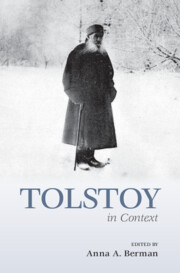Book contents
- Tolstoy in Context
- Tolstoy in Context
- Copyright page
- Contents
- Figures
- Notes on Contributors
- Preface
- Acknowledgments
- Note on Citations, Translations, and Transliterations
- Chronology
- Part I The Man
- Part II Russian Social and Political Contexts
- Part III Literature, the Arts, and Intellectual Life
- Chapter 16 Tolstoy’s Oeuvre
- Chapter 17 Peasant Schools and Education
- Chapter 18 Russian Philosophy
- Chapter 19 The Russian Literary Scene
- Chapter 20 European Literature
- Chapter 21 European Philosophy
- Chapter 22 Theater
- Chapter 23 Music
- Chapter 24 The Visual Arts
- Part IV Science and Technology
- Part V Beyond Russia
- Part VI Tolstoy’s Afterlife
- Suggested Further Reading
- Index
Chapter 20 - European Literature
from Part III - Literature, the Arts, and Intellectual Life
Published online by Cambridge University Press: 05 January 2023
- Tolstoy in Context
- Tolstoy in Context
- Copyright page
- Contents
- Figures
- Notes on Contributors
- Preface
- Acknowledgments
- Note on Citations, Translations, and Transliterations
- Chronology
- Part I The Man
- Part II Russian Social and Political Contexts
- Part III Literature, the Arts, and Intellectual Life
- Chapter 16 Tolstoy’s Oeuvre
- Chapter 17 Peasant Schools and Education
- Chapter 18 Russian Philosophy
- Chapter 19 The Russian Literary Scene
- Chapter 20 European Literature
- Chapter 21 European Philosophy
- Chapter 22 Theater
- Chapter 23 Music
- Chapter 24 The Visual Arts
- Part IV Science and Technology
- Part V Beyond Russia
- Part VI Tolstoy’s Afterlife
- Suggested Further Reading
- Index
Summary
Russian novels are in intense, ambivalent dialogue with the European tradition; Tolstoy’s take up the British and the French in particular. In Anna Karenina, Tolstoy reminds us that adultery is an ever-present threat in the British family novel, as it is in the novel of sensation. Like Tolstoy, Mrs. Henry Wood and Mary Elizabeth Braddon contrast the dynamics of different marriages. They also set adultery in the context of a system that works against women. In Wood’s East Lynne, Carlyle not only forgives his dying ex-wife, but declines to indict her former lover for murder; as he says, “I leave him to a higher retribution: to One who says ‘Vengeance is mine.’” This quote becomes Tolstoy’s epigraph.
- Type
- Chapter
- Information
- Tolstoy in Context , pp. 163 - 170Publisher: Cambridge University PressPrint publication year: 2022

